Xishuangbanna… Poets and dreaming seekers of adventure would probably love that mesmerizing name. Add the words « jungle », « minorities » and « tea plantations » and now it sounds like the perfect place to go! In that state of mind, we rushed eagerly to this region of Southern China, that our dear Mekong river crosses before flowing through Laos, Myanmar and Thailand.
Jinghong, city on the Mekong
« Xishuangbanna is the most tropical area of China », people told us. Well they weren’t lying! It is already 25°C when the bus from Dali drops us in the streets of Jinghong, capital of Xishuangbanna, at 2:00 in the morning. All night, we will roam through the city full of lights and colors and surprisingly busy. We already knew that Chinese never sleep, but this is made even worse by the intolerable day-heat. A lot of people seems to rather enjoy the « freshness » of Jinghong’s nights. As dawn shows up, we are so exhausted that we fall asleep on a public bench. We are awaken shortly afterward by a charming agitation so typical of China : old people are exercising, a group of women is dancing and a taï-chi teacher is showing slow movements to his devoted students…
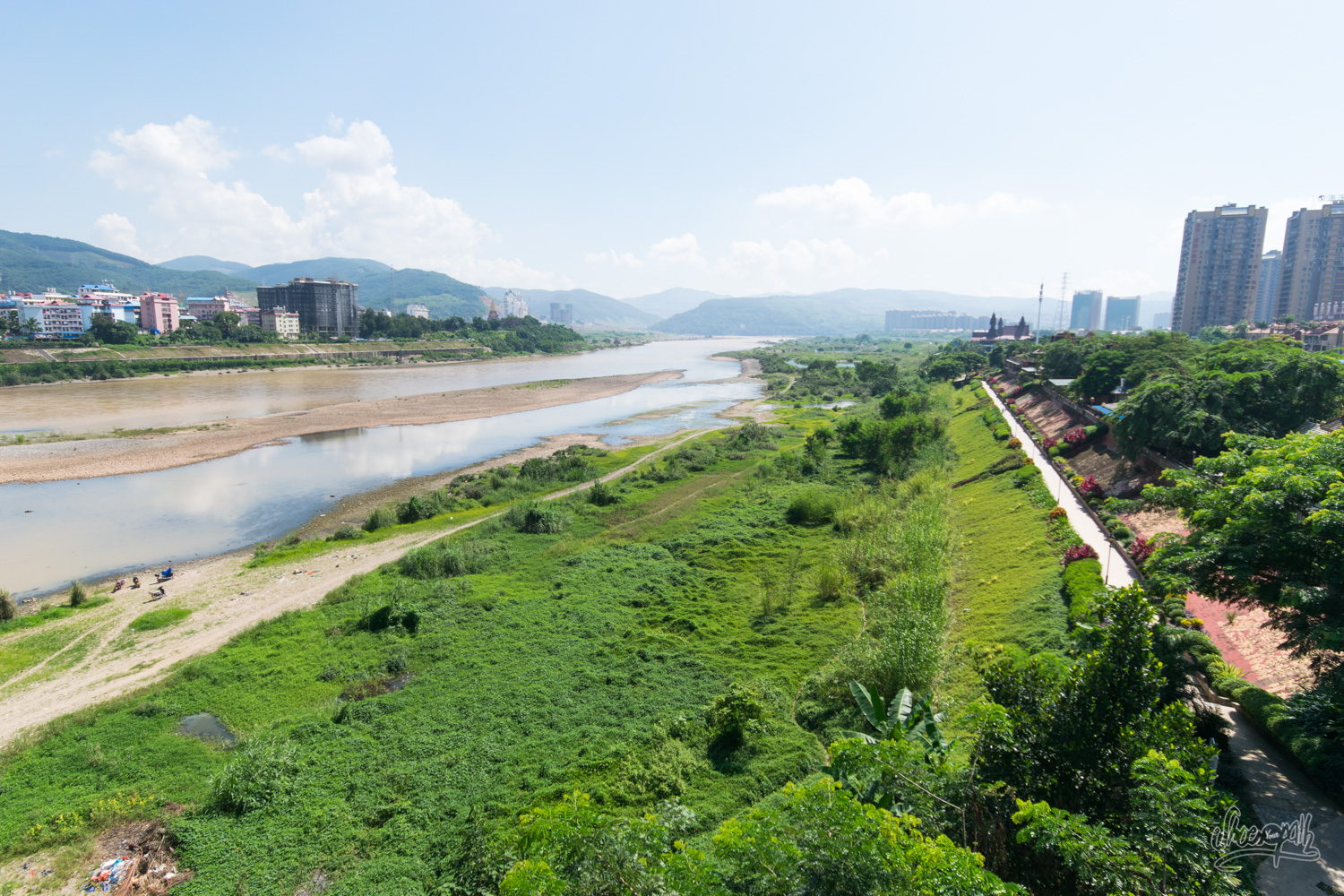
Jinghong is a modern town displaying newly built glittering tawdry hotels and mega-blocks. Despite of that, Jinghong tends to be an agreeable city thanks to large shady avenues, giant palm trees and nice walking paths along the Mekong. We are quite happy to spend a few days here, feeding on succulent burgers and pizzas, but also on fine local cuisine : chicken cooked with banana flower, grilled spicy fish with lemongrass and rice with ananas… Some people will think : « Look at those two fake adventurers. They are in an amazing area where many discoveries probably await them and the only thing they think about is food! » But in fact, we also spend that time in town to organize two amazing treks through banana jungles, tea fields and remote villages!
South Xishuangbanna: from Damenglong to Bulangshan
First our feet lead us to the South, in the « basins » principally populated by the Dai minority. Xishuangbanna is an area of extreme cultural diversity, home of 13 different ethnic groups. Dai people represent 30% of the population and are also called « basin people » in opposition to other minorities living in the hills referred to as « mountain people ». In these « basins », they mass-produce bananas and rubber, which jungle-like plantations are covering every parts of the landscape, in addition to lush forests of giant bamboos. Initially, we wanted to travel on foot around 60km between the small town of Damenglong to Bulangshan. Without a precise map of the area, we were counting on the locals to find our way. They are very nice and helpful people and not only were they happy to show us the right way but they also took us very often in their car/truck/ute-motorbike for a few kilometers! Consequence: in total we only walked half the distance! But we were very happy to meet all the amazing people who gave us a ride. Two of them, a young couple driving an old rusty pickup-motorbike, even brought us back home to enjoy a few refreshments and an enormous pomelo the size of a watermelon.
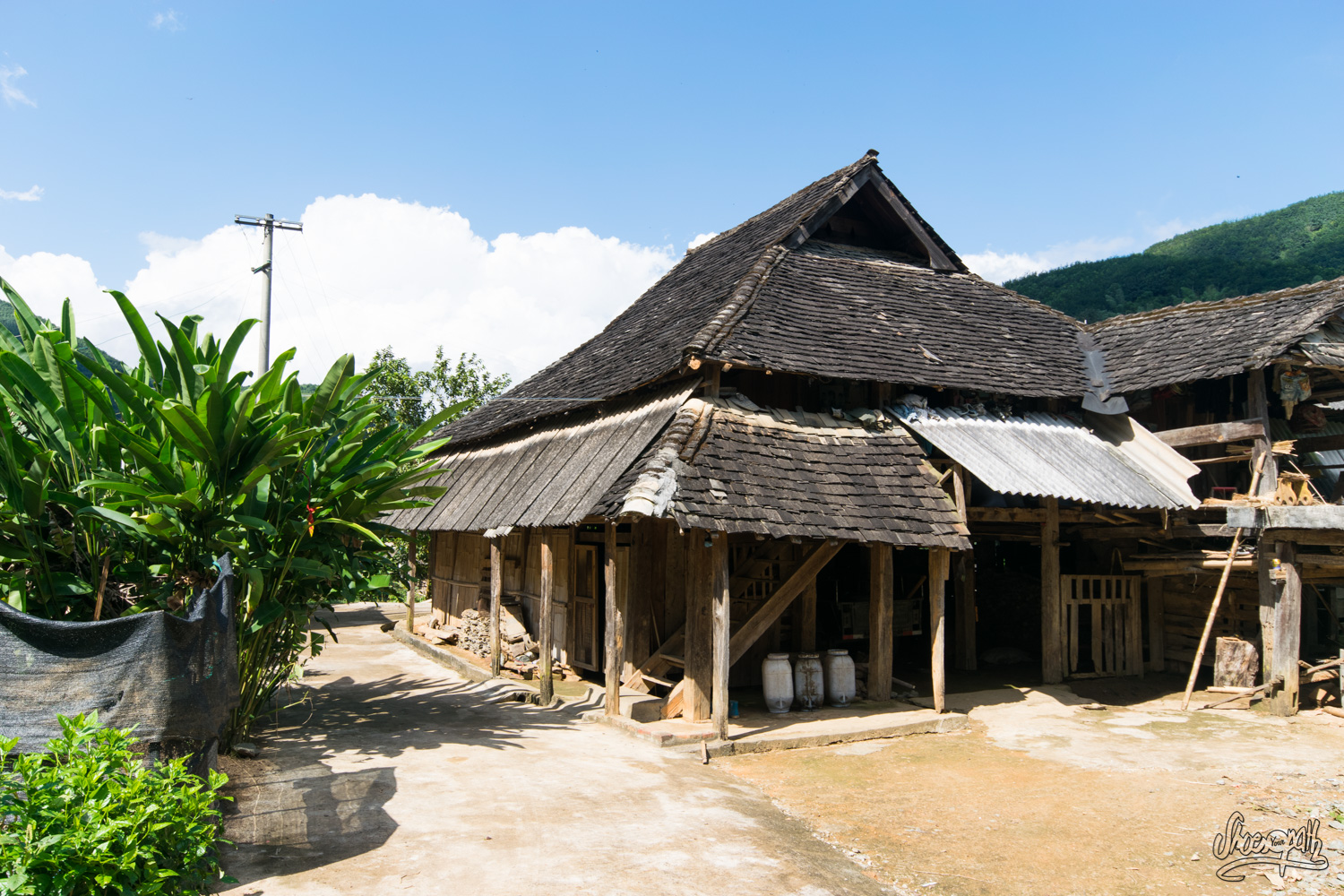
On the way to Bulangshan, we encounter a lot of very pretty ancient villages. However, we can’t help to notice that concrete is now replacing wood in the new buildings. Sad to say, but the old architecture will probably disappear within ten years… Also, every Dai village has its own buddhist temple, generally richly decorated, colorful and shiny. Looking at them, we already feel in Myanmar or in Thailand!
In Manbo’s temple, we meet a group of oldies enjoying the relaxing atmosphere of the shady courtyard. Indeed this place is the perfect description of « la douceur de vivre ! » We feel like staying there forever, happy and slowly drowsing while the grandpas and grandmas press us with questions. « Where are you going? And where do you come from? » We answer as we can, mostly by gestures and silly faces to be honest, which make them cracking up laughing! The men are wearing simple white clothes and the women all have amazing… Black teeth! An ink-black smile was considered utterly beautiful and fashionable when those ladies were still in the spring of their lives. Nowadays in their eighties, they continue the tradition. The product they use is also supposed to have the virtu to preserve teeth from disease. And as far as we can see, these ladies still have amazing smiles, don’t you think?
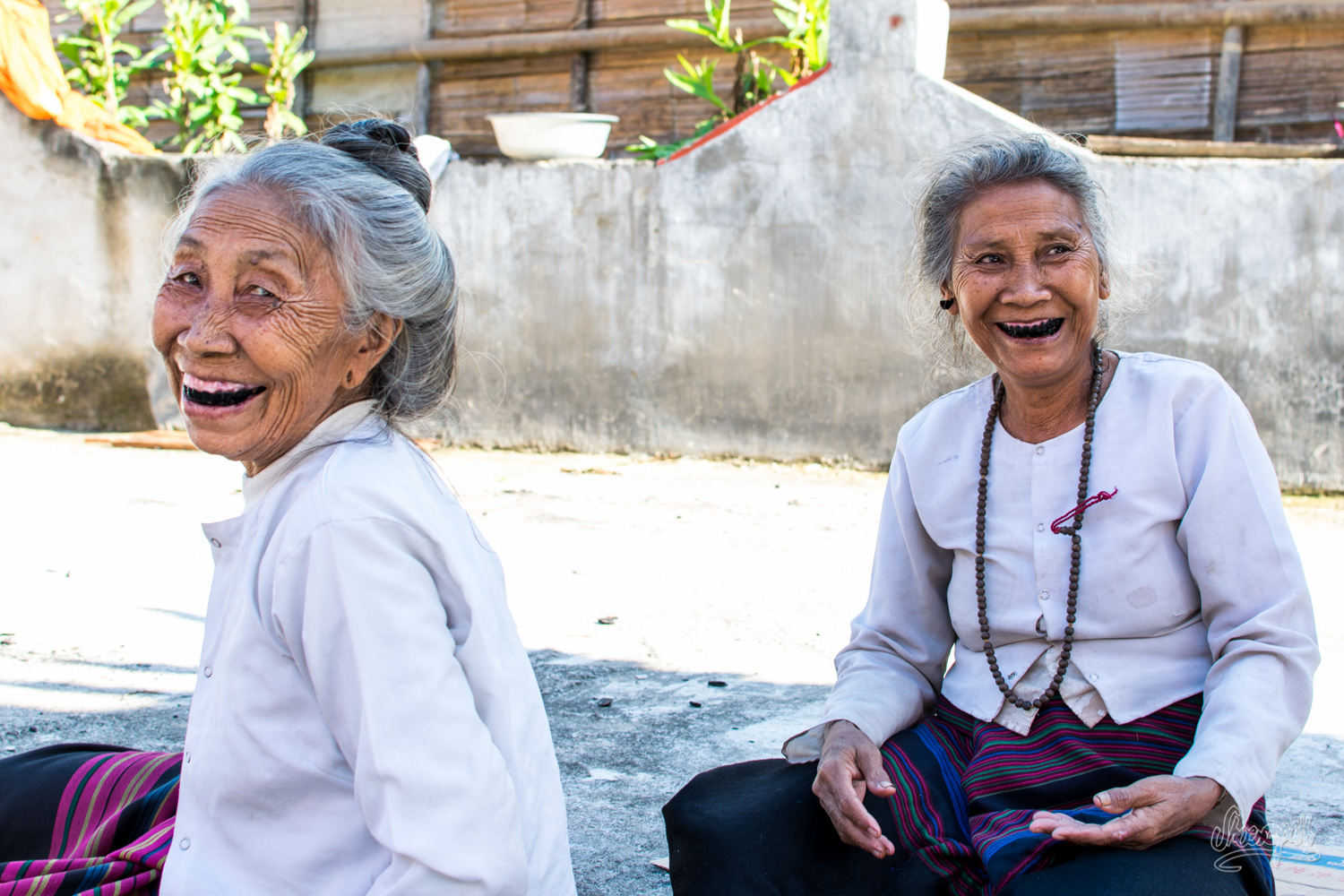
We finally manage to leave the relaxing temple and walk a few more kilometers before finding a suitable flat place to set up the tent. We love camping so much! Nothing better than to fall asleep listening to the sounds of the night while remembering the awesome events of the day! The following morning, we reach the small village of Weidong. Nothing crazy about this town except we heard about an impressive waterfall lost in the jungle somewhere nearby. Considering the heat of the sun today, a fresh and beautiful waterfall is more than tantalizing! Immediately, we set off for a walk up a steep hill in the direction pointed by villagers. The heat reminds us of a bread oven and we soon feel like in a golden crispy baguette’s personal Hell. As you can imagine, we are sweating profusely. A few kilometers later, we are not far from total despair. Where is this bloody waterfall? Fortunately, we soon hear the rumor of running water coming from the thick jungle. After a little struggle going down a narrow path and splashing in the stream, we finally get to the foot of the waterfall. Nice spot for a picnic, don’t you agree?
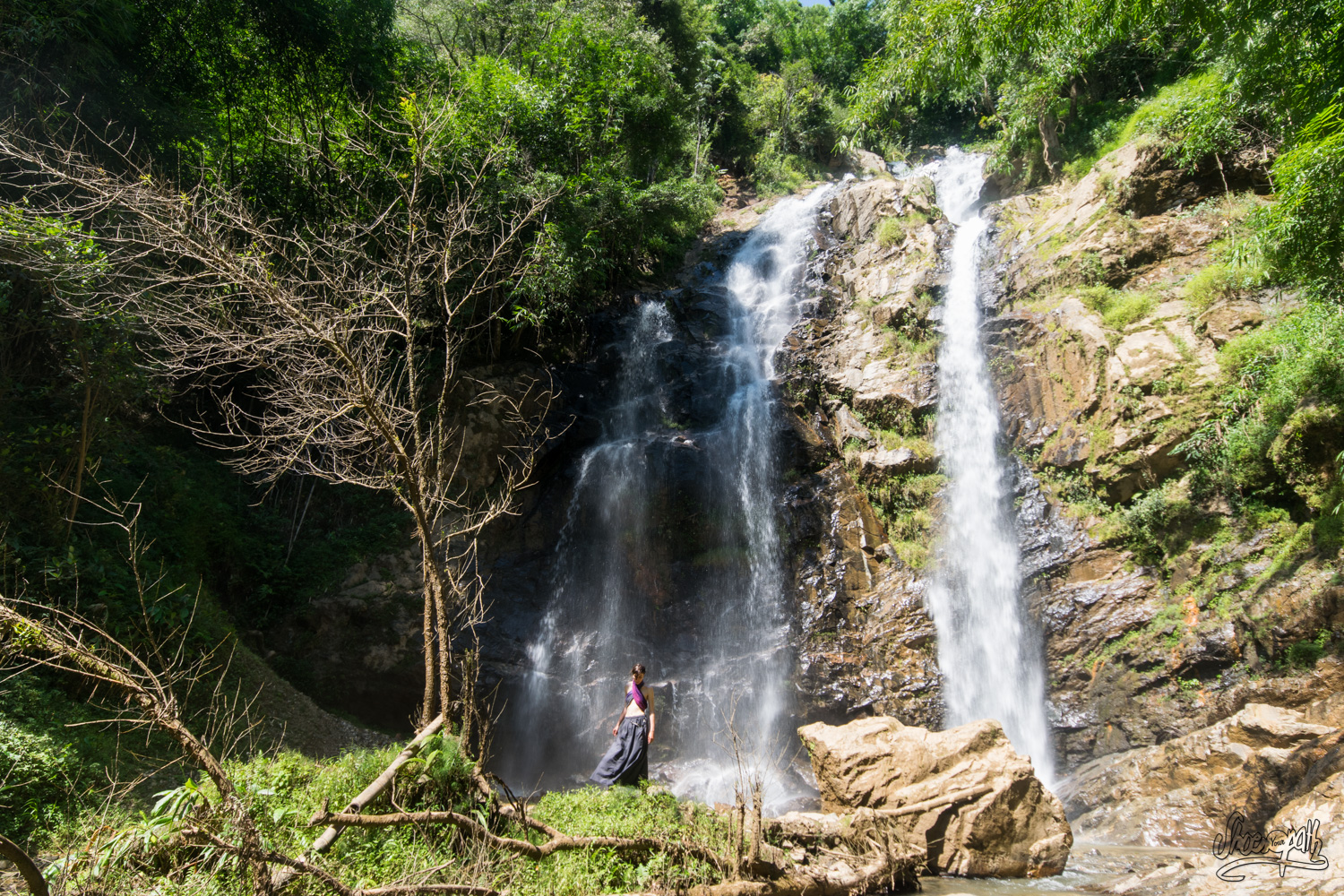
The waterfall is quite remote, but apparently quite renowned too… As we are relaxing and enjoying the quietness of the place, a group of Chinese tourists appear, suddenly popping up from nowhere! Where the hell do they come from? Among them are two young women traveling with their guide/driver. They speak a little English. Mixed to our weak Chinese, we manage to have a quite interesting talk together. Soon they offer us to join them on their trip to Bulangshan where they will invite us to the restaurant, despite our loud and embarrassed protests! Not only that, but they will also drive us a 100km more for free, up to the big town of Menghai where it will be easier for us to catch a bus. They are so generous, really. On top of that, we stop on the way to visit the interesting sights of the area, like a beautiful Dai temple and a plantation of old tea trees. The oldest one is 500 years old! We can’t believe our luck. We are blushing from shame remembering the way we talked about Chinese tourists when we were in France. To put it mildly, we are afraid it wasn’t very generous and welcoming at the time…
From Xiding to Bada, hills and tea trees
The following morning, we leave the charmless city of Menghai for the small western town of Xiding. We are very close from the burmese border but it would be quite risky to get any closer. Because of drug traffics, this zone is patrolled by heaps of cranky and suspicious Chinese soldiers. Or so people say! But we will have an experience that will slightly change our point of view… We will talk about it later!
Xiding is not very interesting except on Thursday morning, when the market takes place. Then the whole place starts buzzing, people are running everywhere and laughing, sharing news, buying goods of all kind, old women carrying baskets on their backs, and men already drinking huge quantities of baijiu (this horrible Chinese firewater). Most women are wearing their traditional clothes. It’s really not to be missed and we are lucky. Guess what’s the day today?
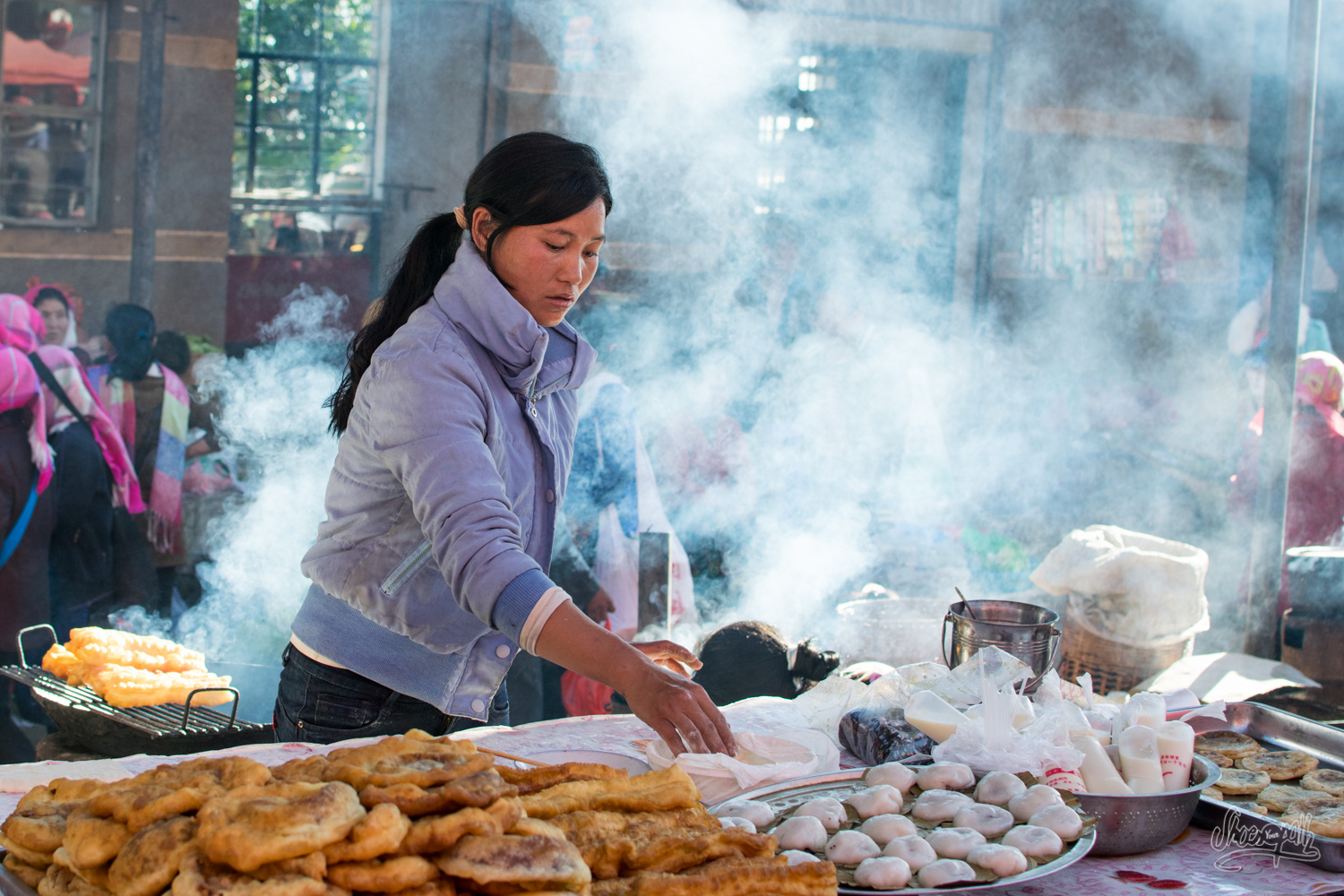
After the market, we set up for a two-days walk through the hilly landscape to the small village of Bada. Here is the land of « mountain people », belonging principally to the Akha and Bulang tribes who specialized thousands of years ago in the culture of tea! As a consequence, this tea, called Pu’Er, is the best and the most famous tea of China. To give you an idea, prices for the best Pu’Er can go up to 1600$/kg!! The landscape is covered by fields of those small lucrative bush-trees conscientiously cared after. The view is quite nice! When we can actually see something! Indeed, sometimes the track gets lost in thick lush vegetation where snooty bamboos try their best to reach the height of sequoias…
Here too, things are changing fast. The economic boom of the last ten years combined with the Chinese passion for tea have made de prices climb up like crazy. If some small villages keep their old style and traditions, most towns are now building flashy (ugly) three-stories palaces to replace their typical but crumbling old houses.
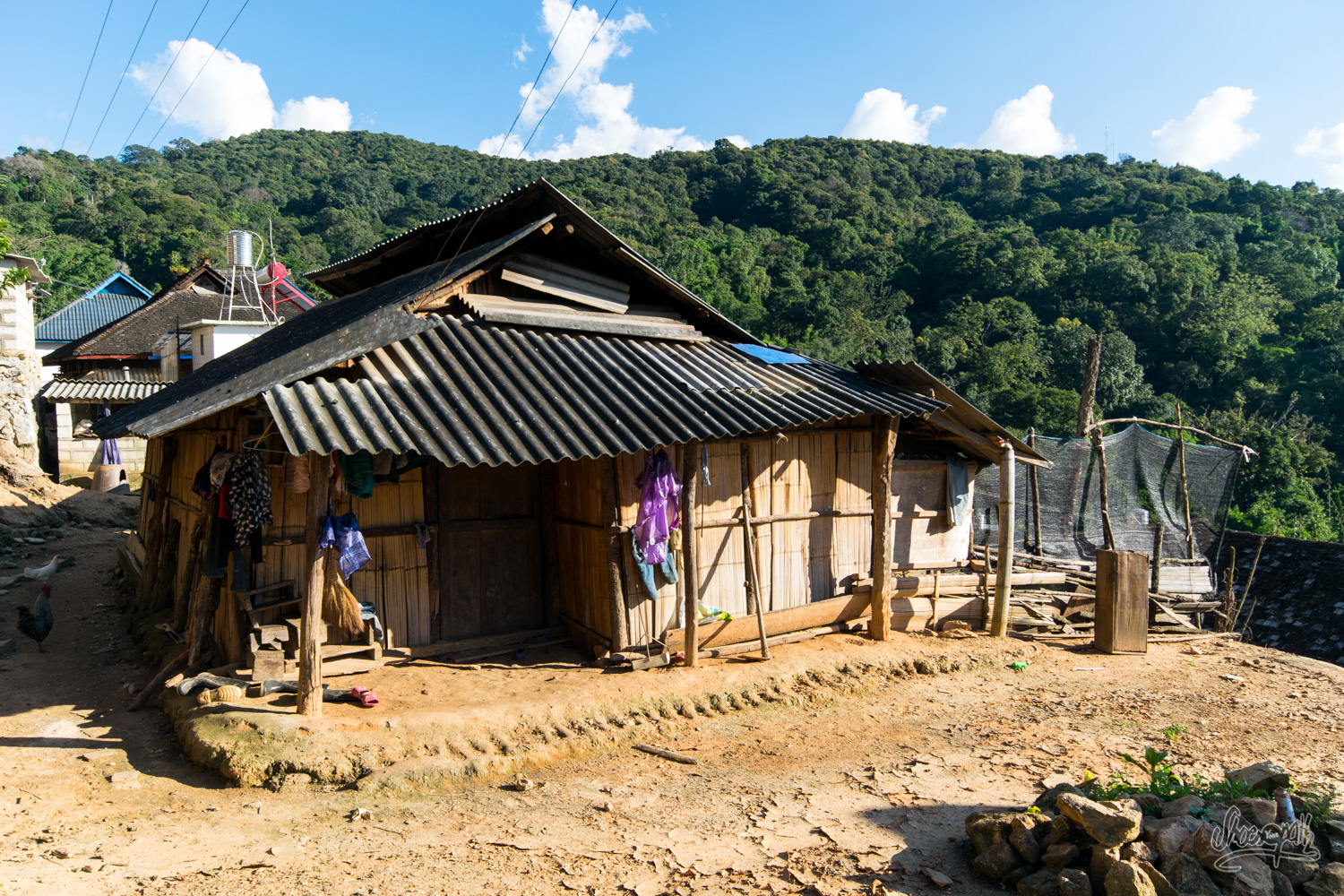
One may regret the past time, when modernity was still kept at bay and traditions preserved museum-like in the perfect historical charming beauty of a middle age village. This sudden access to money and technology is killing fast the traditional way of life and local culture. But in the meantime, can we refuse these people a modern way of life under the pretext, touristic or not, that we have to preserve traditions?
The track we choose to follow is going through villages far more « authentic » than the ones we just talk about. They are called Zhang lang, Man’wa or else. There, children are running naked in the dust, people are walking barefoot and pigs and chickens wander freely in the streets. Houses are still mainly made of wood and women still wear their traditional clothes. But here like everywhere else people are worshipping that strange god named TV. At lunch time, we were enjoying a well-earned break in the shade of a gloomy weary-looking house. We keep company to two adorable women watching their melodramatic chinese serie. « This is so weird », we thought.
The europeanized scenario and characters are so far away from these women’s reality… What’s happening in their mind when they watch that kind of program? What do they think about it? Despite their obsession for TV shows, people are as nice and welcoming as usual! In the villages we only meet old folks and little babies, as the parents are working in the fields and the children are at school in Bada. The following day, we meet all the kids on their way back from school. « Hello! », »how are you! », « good morning teacher », they half-shout, half-laugh. They have such amazing smiles! Most of them have 10 to 20 km to walk everyday to go to school!!
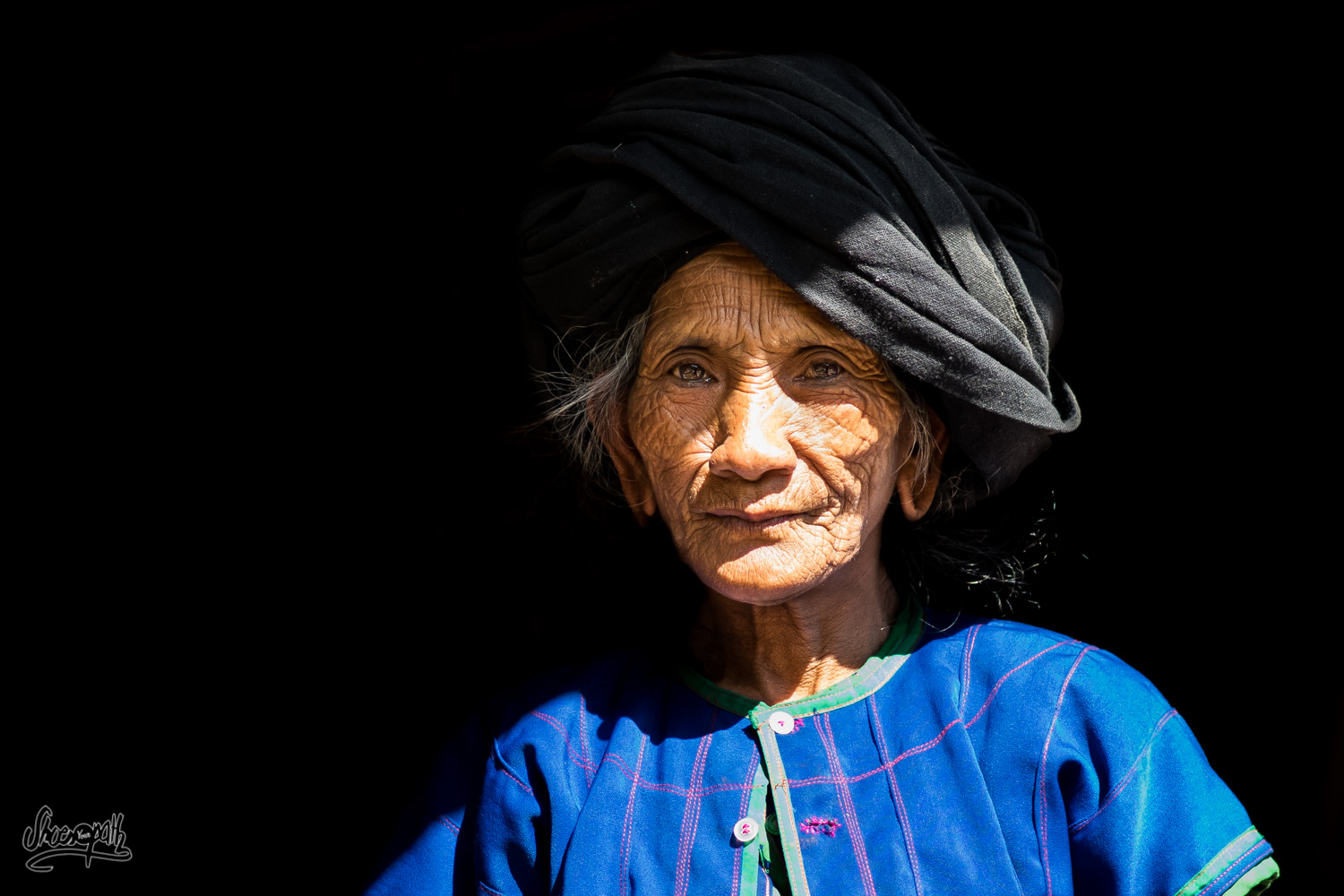
We finally get to Bada. After these two last magical days, we have trouble adjusting to the post-communist ugliness of the city centre. We rarely saw something so depressing! Moreover, we have to pay an excessive price for a basic room which add to our morose mood. To cheer up a little bit we take the direction of the nearest (and only) restaurant… Which is full of Chinese officers!!
- « Damn! We think. They are going to be a pain. »
Resigned, we wait for the unavoidable questions and control… But nothing comes! Instead the officers invite us to party with them… Ouch! They are quite drunk already. They offer us food, beers and huge quantities of baijiu that we drink yelling « Campai »(bottoms up)! We are very tired by our walking day but we really don’t know how to escape the table politely. We really don’t want to drink too but it is very hard to refuse them. To put it lightly, the more they drink the more they get excited and insistent! It will take us a few hours before we manage to get away from this generous (yet unwanted) attention. Next day, waking up is a torture but we manage miraculously to be on time for the early bus departure. The driver is not… He will be nearly an hour late. Too much baijiu yesterday maybe?
See you soon
M. & Mme Shoes
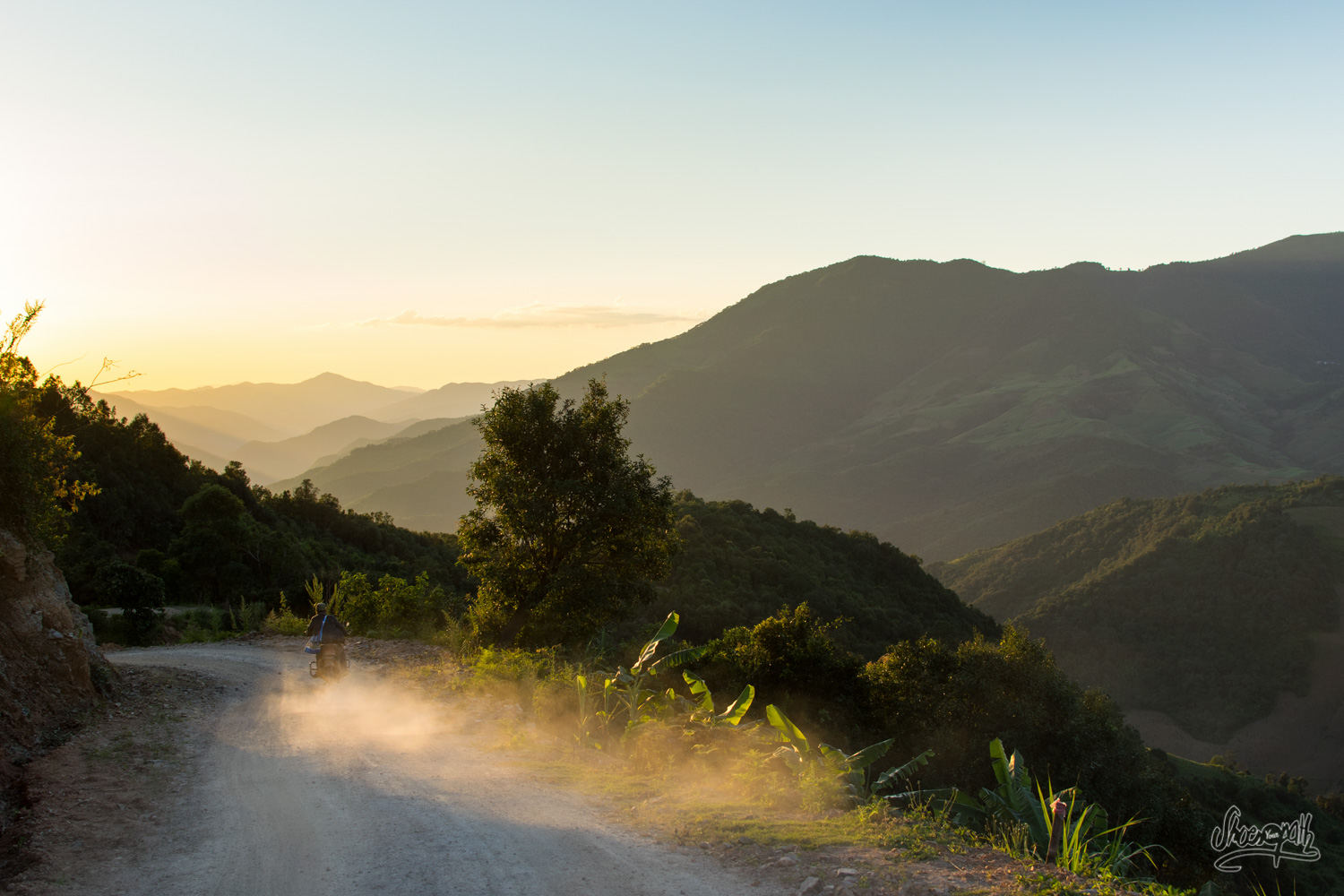
Faces of Asia
Xishuangbanna has been more than landscapes and tradionnal villages. It’s been a lot of metting, beautiful faces and smiles. We shot so many pictures of people that it has been hard to choose between them and reduce the number for the gallery. So here is a selection of 30 of them :
Tips :
Treking in Xishuangbanna :
- Several agences or cafés propose a few guided trips in Xishuangbanna, from 1 day trip to several days.
We recommand to hire a guide from the Mékong Café. They have a very nice cultural background and a good english level. They propose multiple options : jungle, traditional villages, or a trek special for tea in the ancient tea mountains.
Around 400CYN/day/person (including transportation, food, accomation).
Ask for Lijuan at the café.
Address : Jinglan Guoji F1-104 Menglong Road Jinghong Yunnan China - It’s also possible to trek alone as we did. For this, get a map of the region (The Mekong Café can give you a touristic one for free), and then take a bus to Damenlong or Xiding.
It’s very easy to do a nice one alone : from Xiding follow the road that goes down the village, and after a few kilometers on the paved road take the road that goes down on the right side in the direction of Zhang Lan. Follow that « road/track » to Zhang Lang where you can spend a night, and then to Man Wa and Bada. It’s not a propoer trail through the forest, it’s more a dirt road, but you’ll still go through jungle, tea plantations, and ancient villages.
It’s possible to get water and food at the villages. But be careful the road can be long between the village, so take enough water, especially in summer, and between Zhang Lang and Man Wa where the road is steep.
In Zhang Lang or Man Wa, if you want to sleep in a local house, ask around in the village, you’ll be hosted and fed. Let them a little bit of money, like 50CYN.
Buses in Xishuangbanna :
Menghai is the central station for Xishuangbanna, all the buses pass through
- From Jinghong :
Direct to Damenglong every 30mn from south station.
To Menghai every 30mn from central station. - From Menghai :
To Jinghong every 30mn
To Xiding, 2 buses a day : 10:40 and 15:30
To Bulangshan, 2 buses a day : 09:30 and 15:00
To Bada, 1 bus per day : 14:30 - From Xiding :
To Menghai, 2 buses a day : 08:00 and 13:30 - From Bada :
To Menghai, 1 bus per day : 08:00 - From Bulangshan :
To Menghai, 2 buses a day : 08:00 and 14:00 - From Damenglong :
To Jinghong : ???

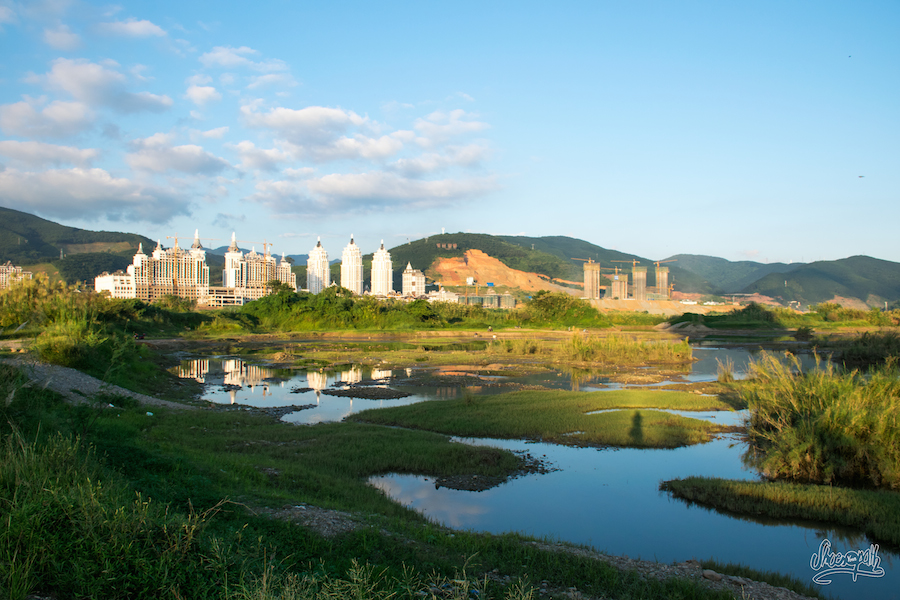
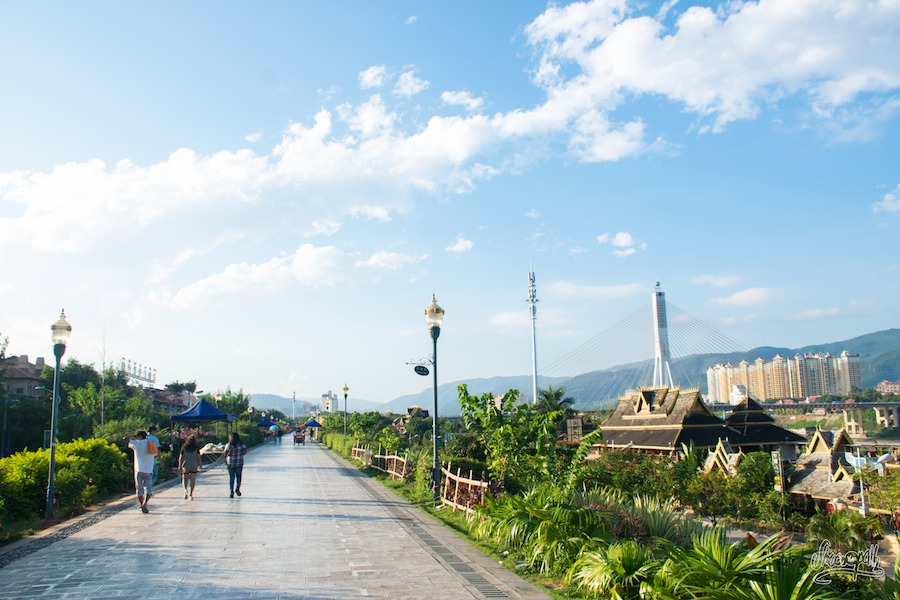

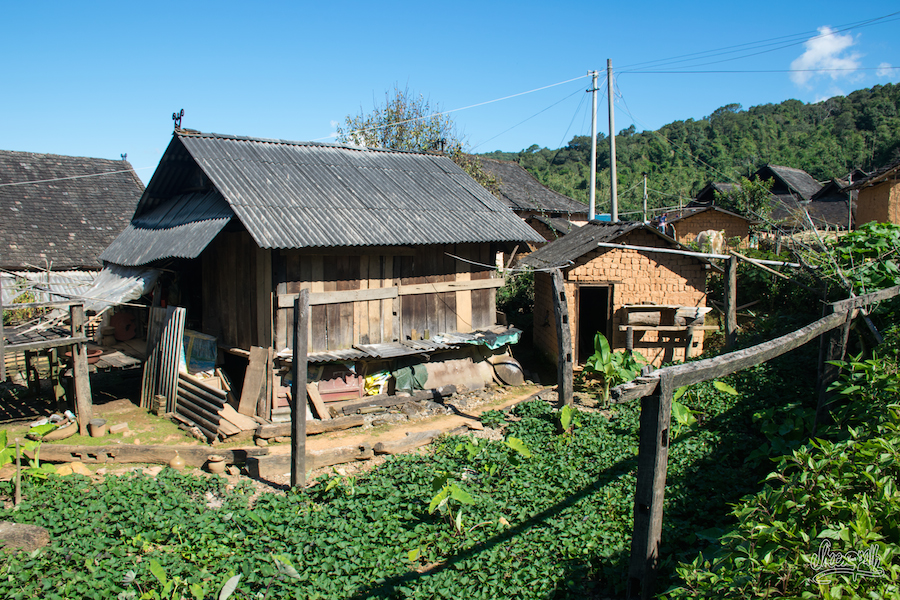
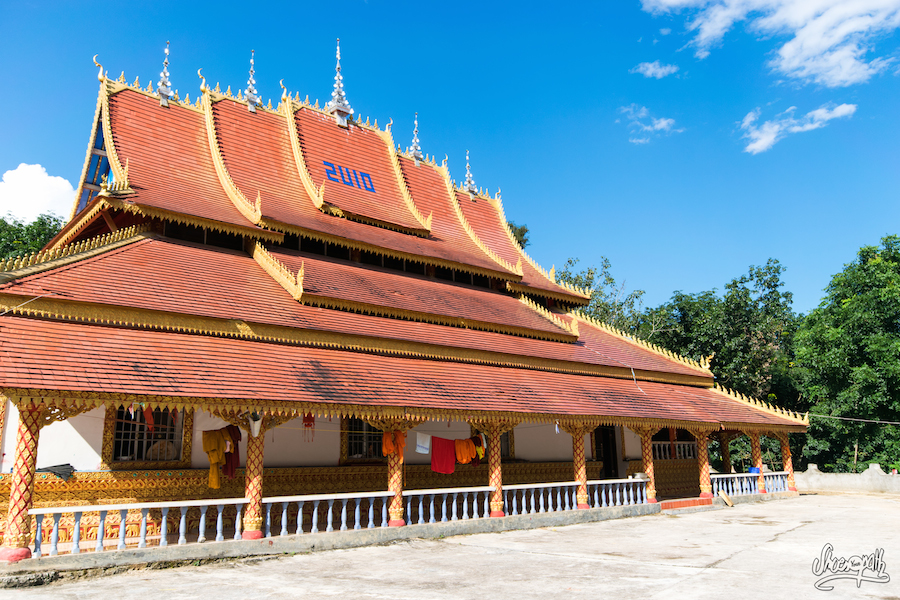
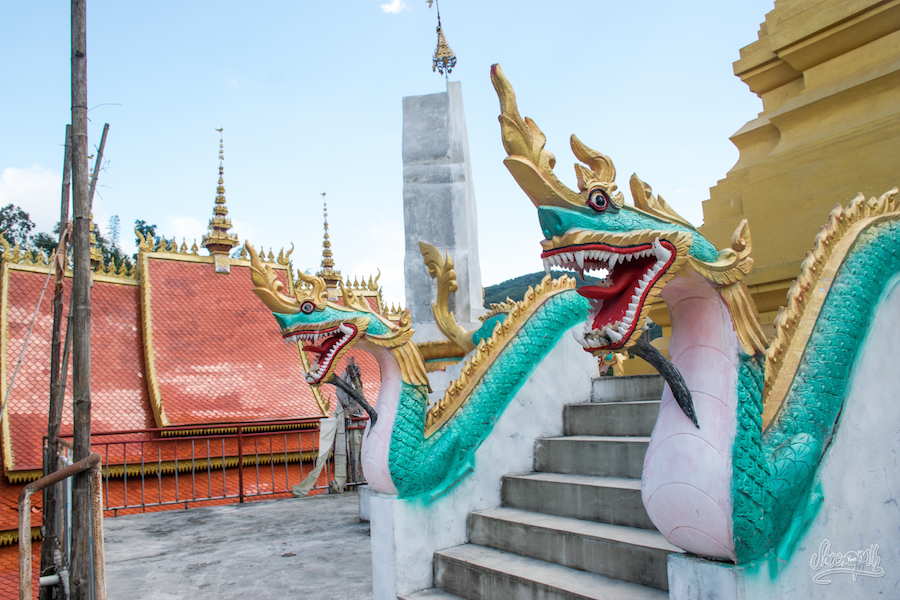
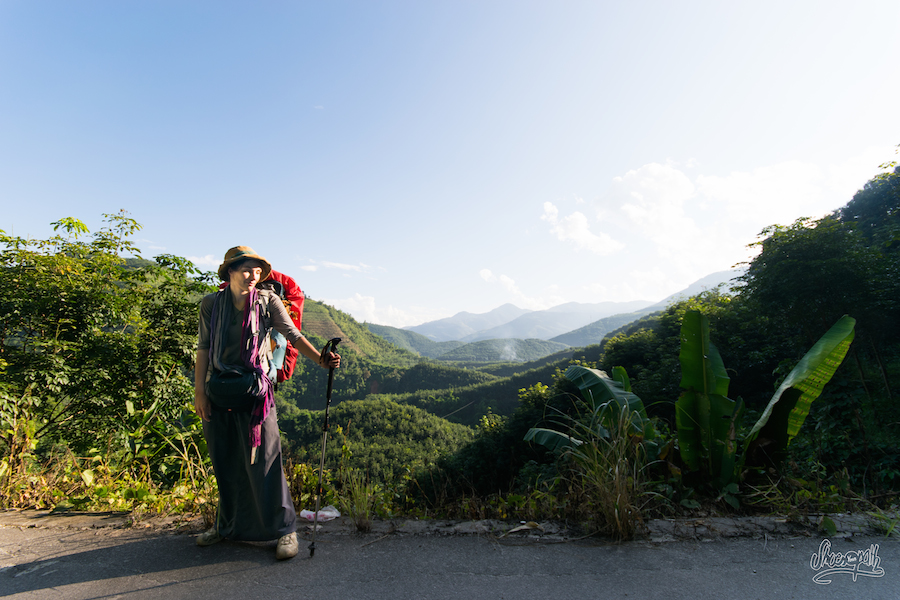
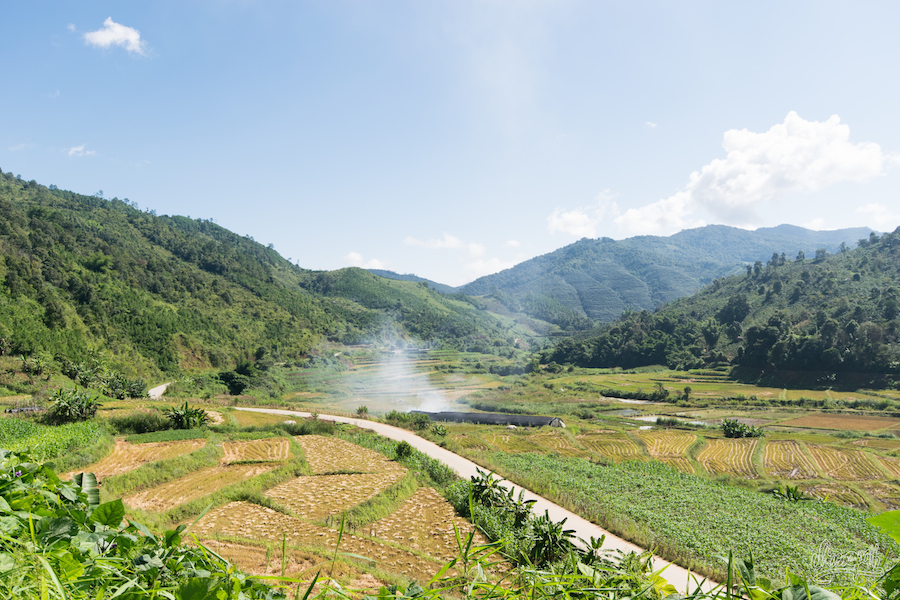
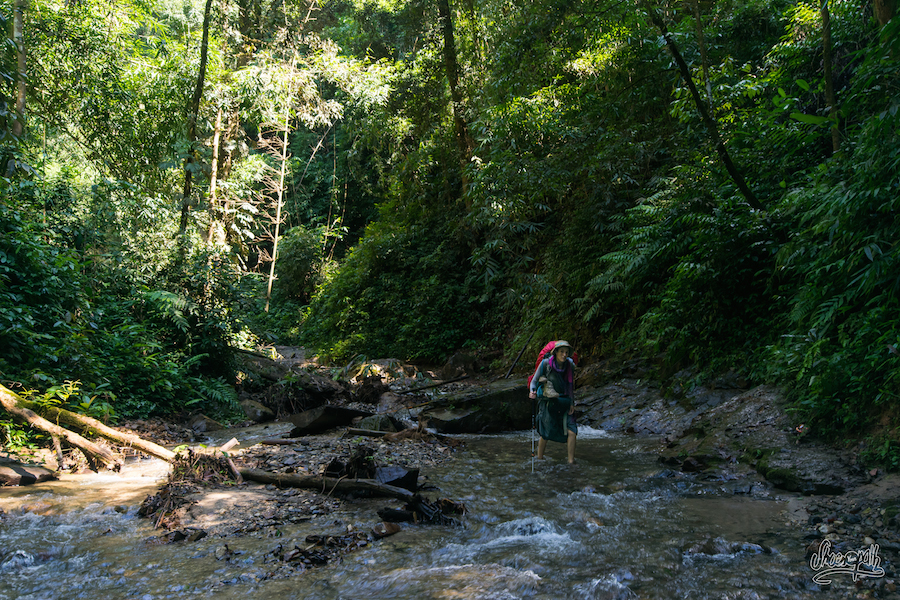
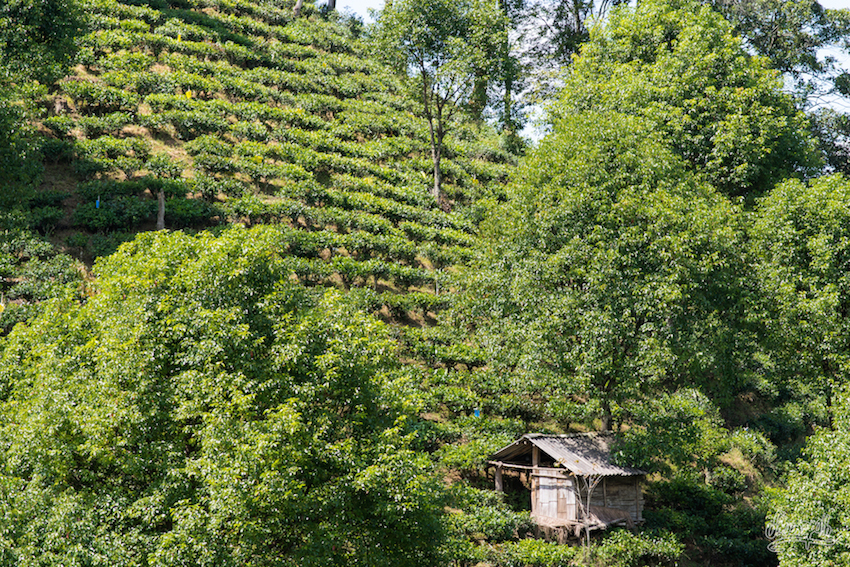
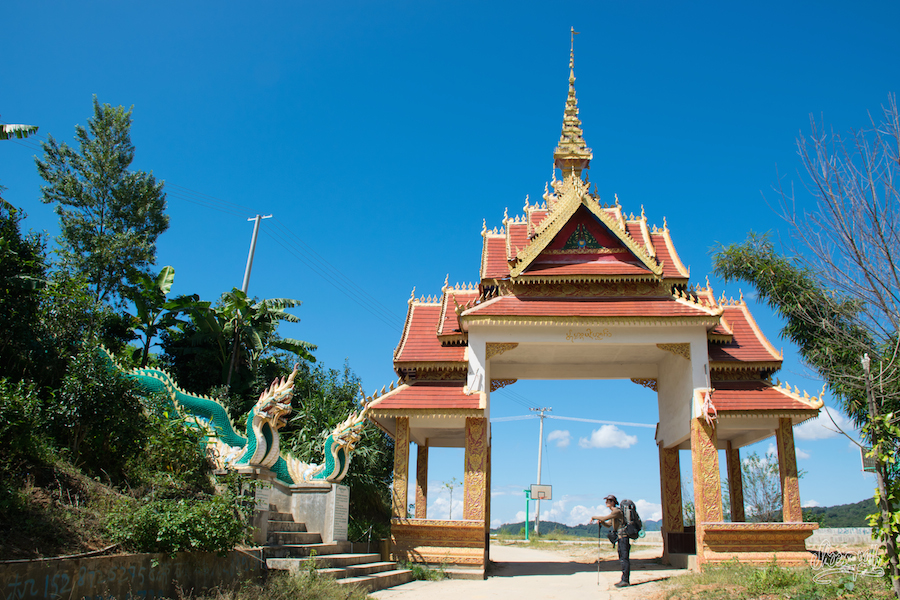
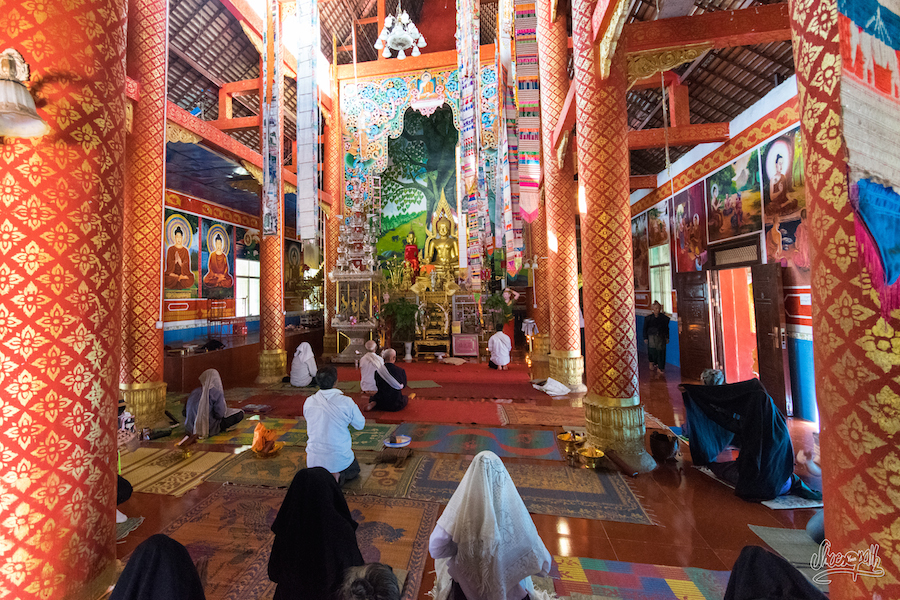
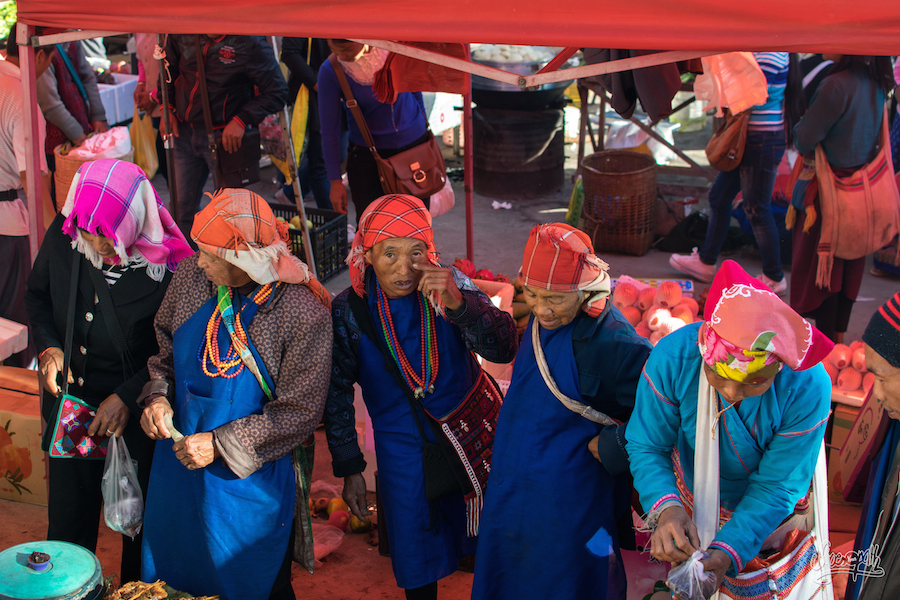
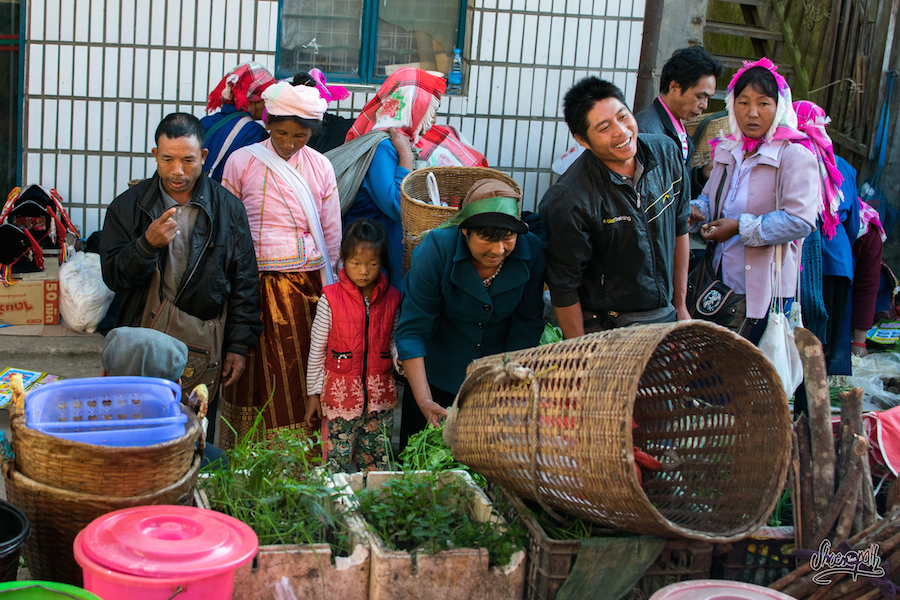
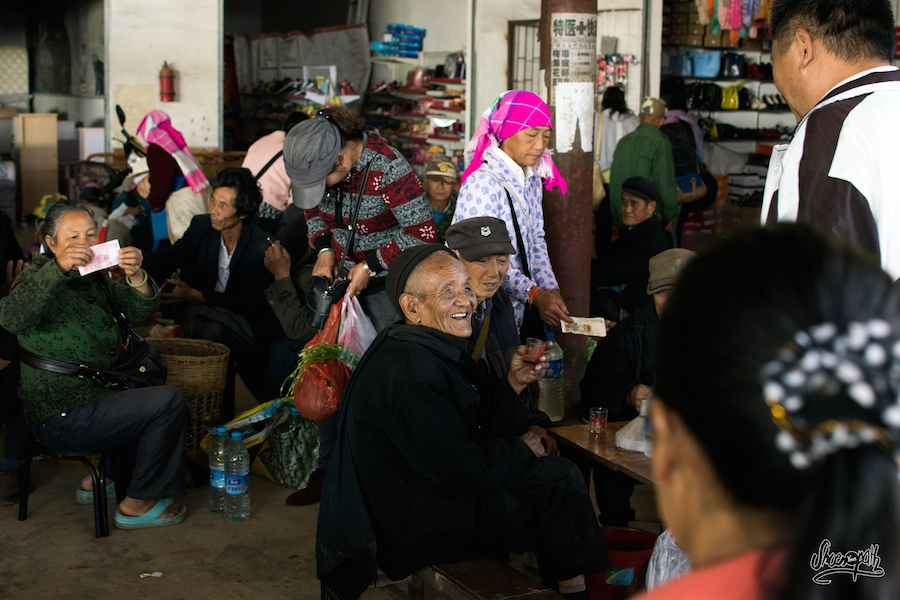
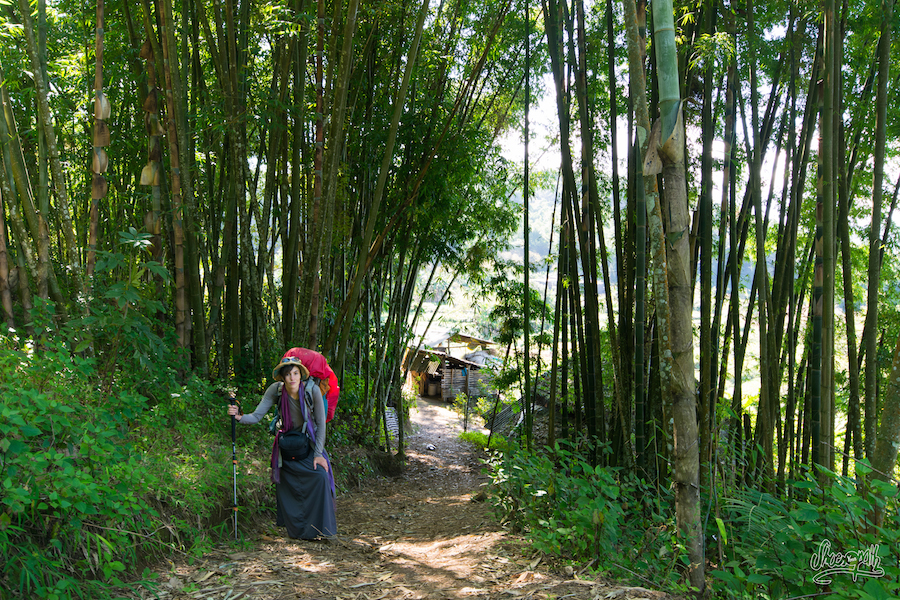
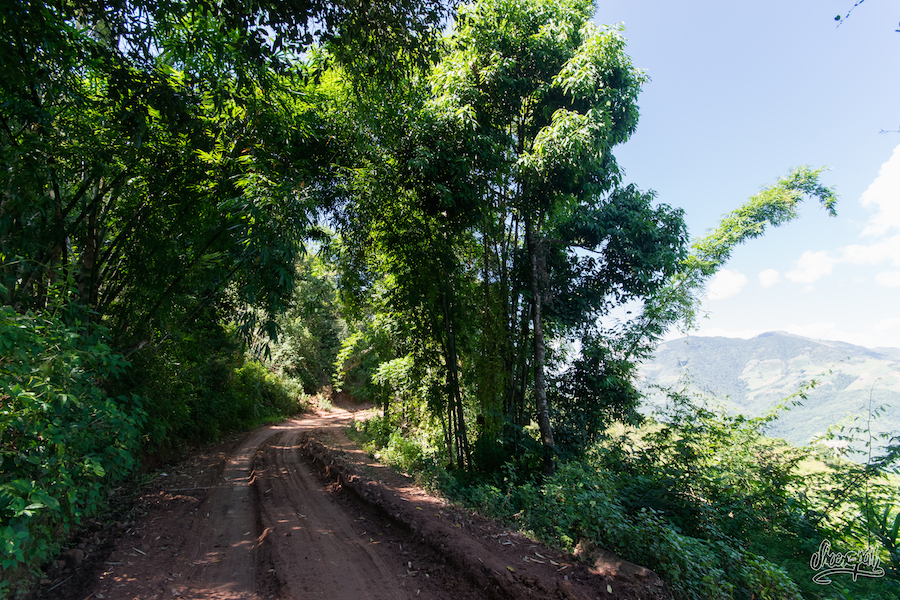
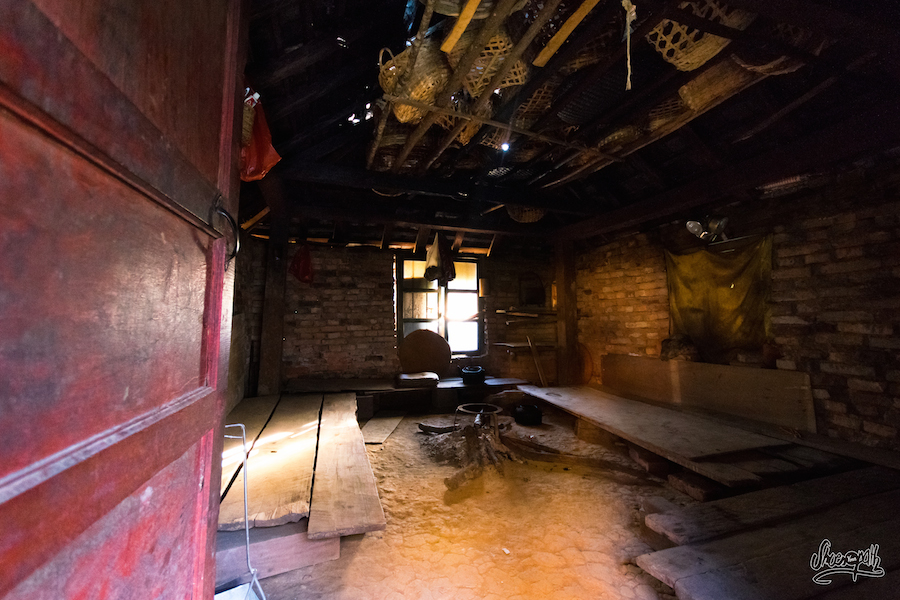
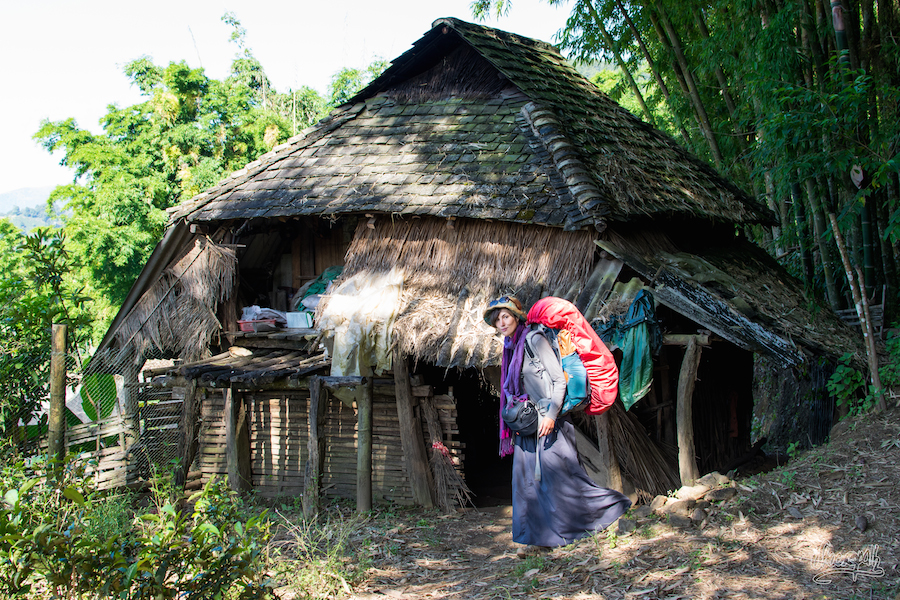
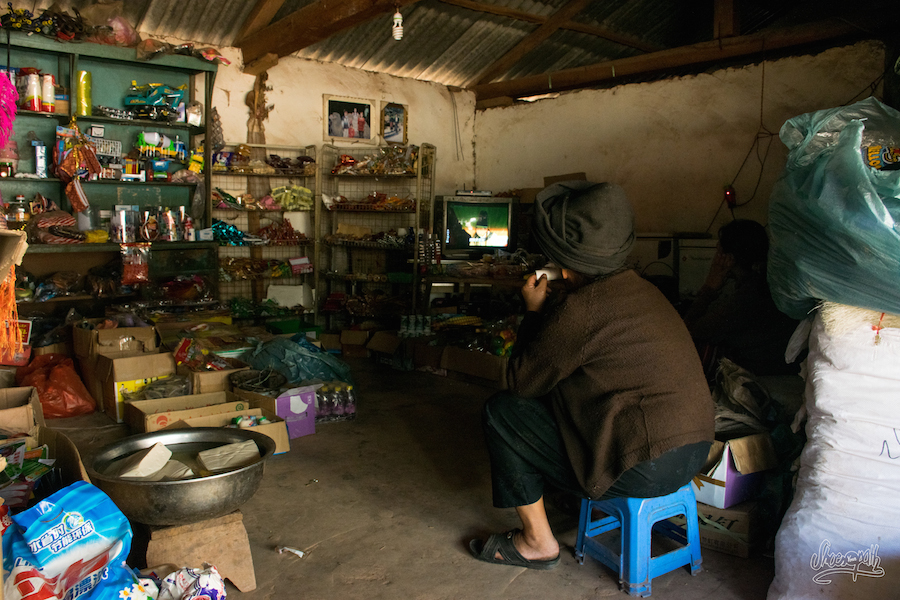
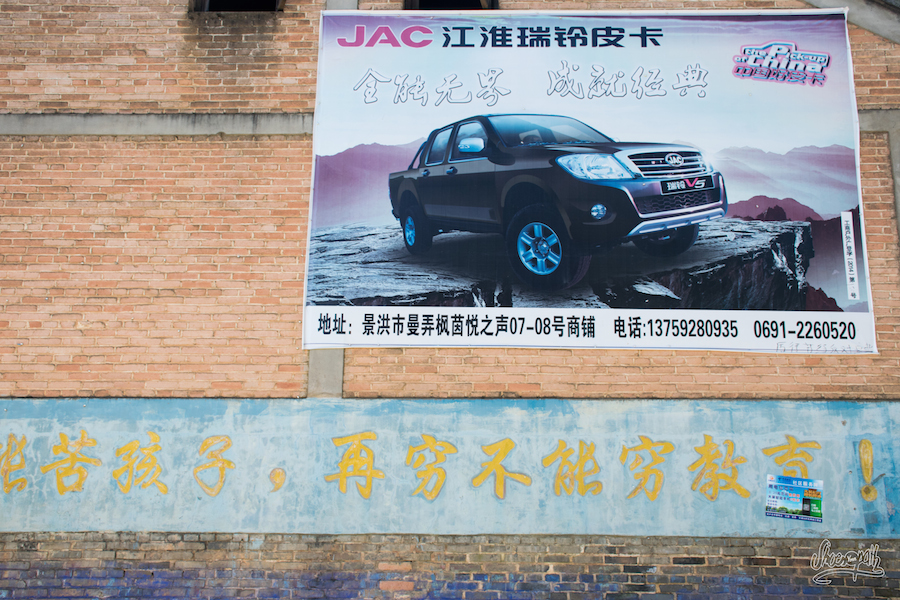
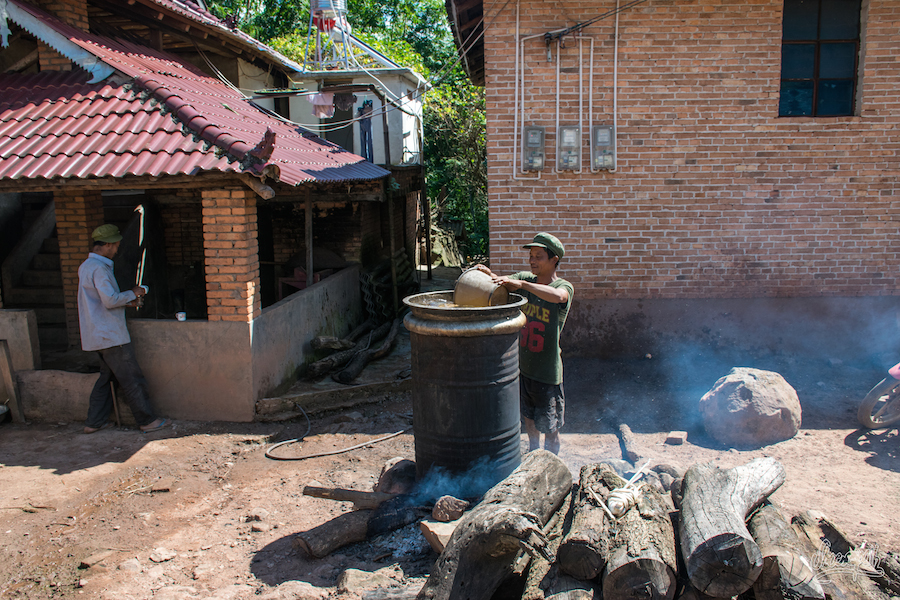
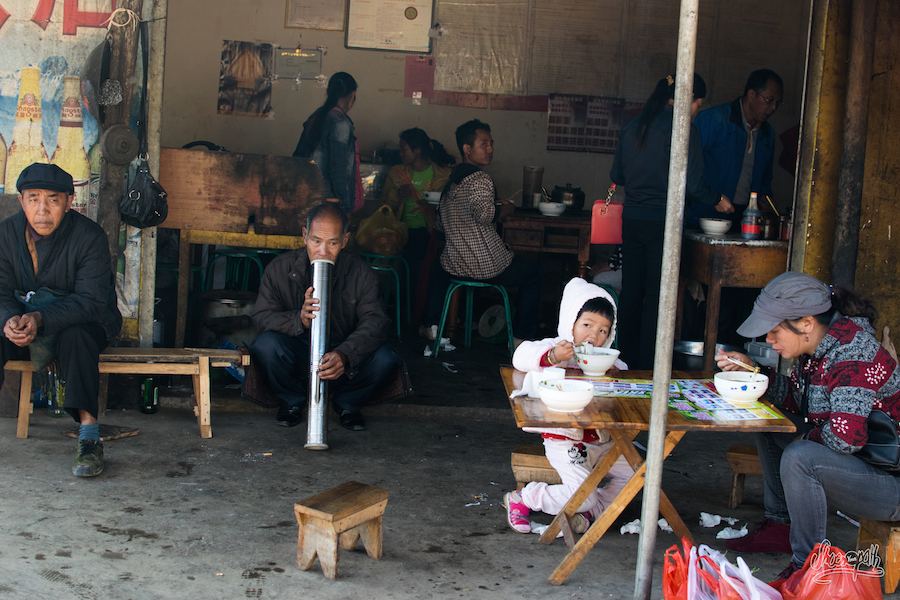
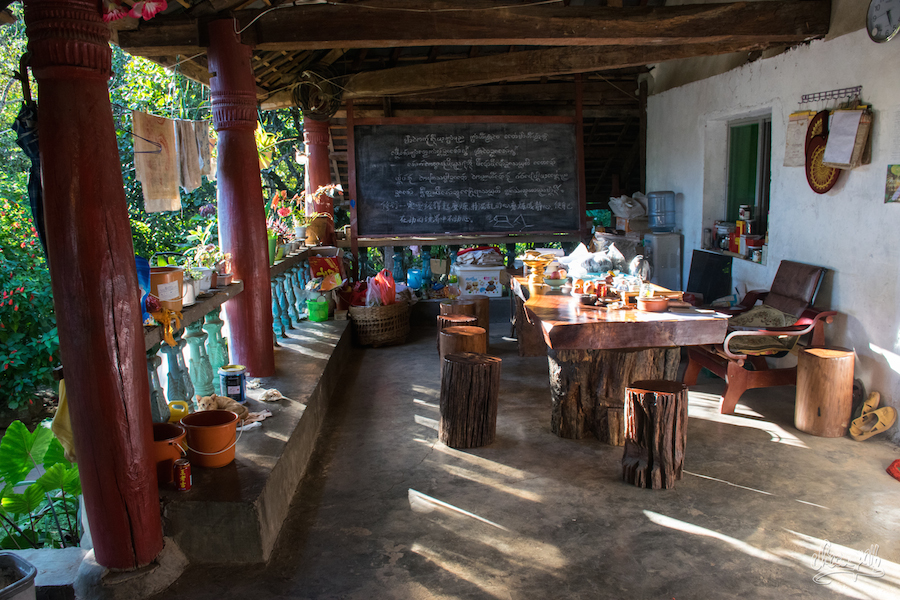

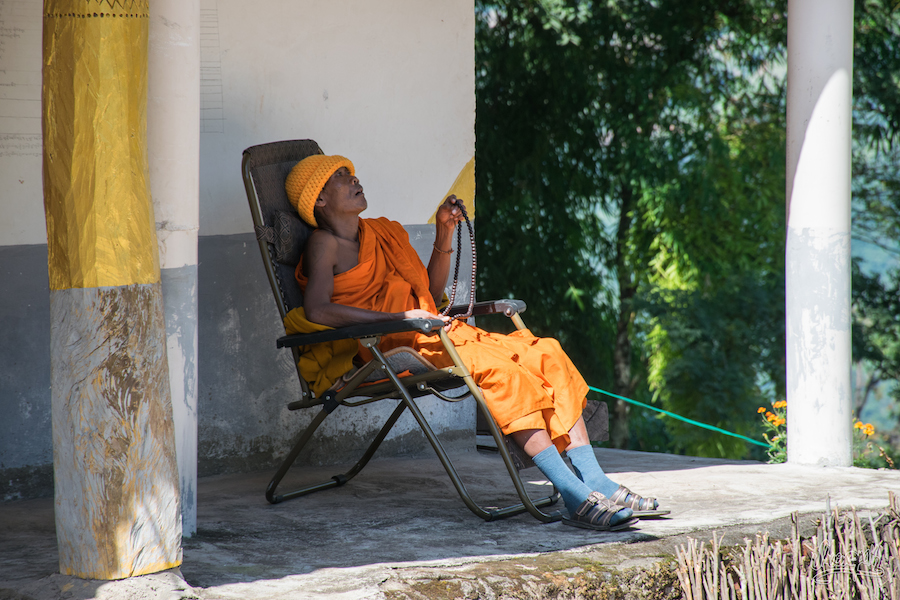
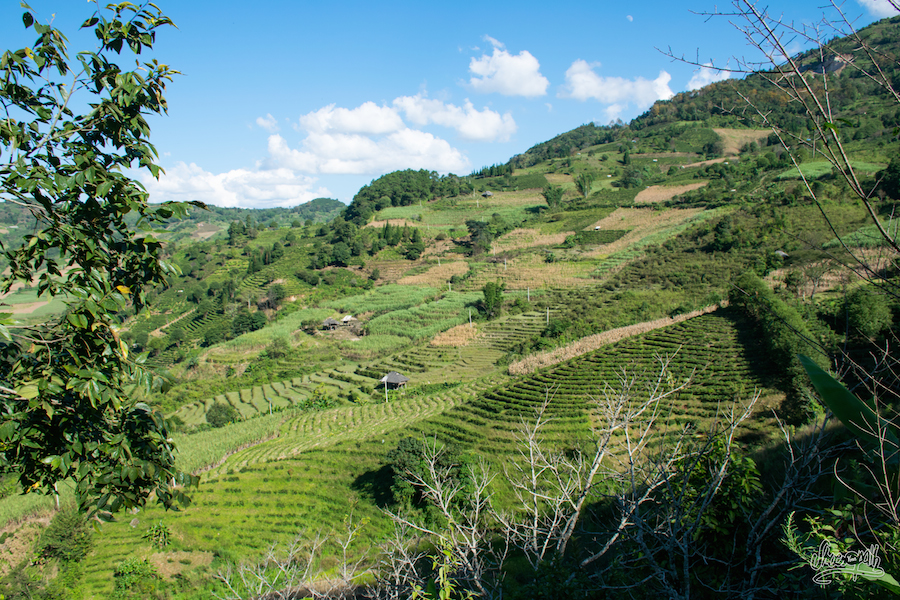
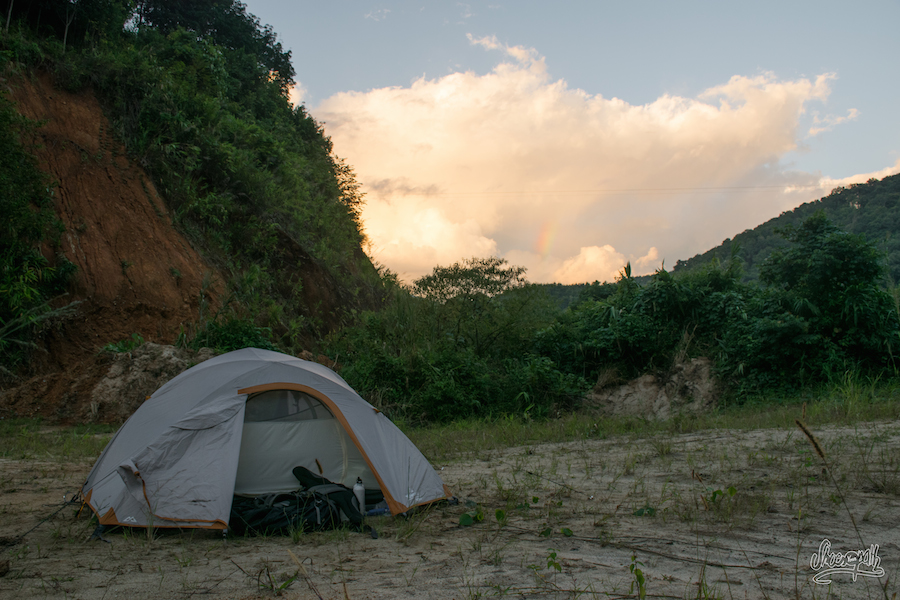
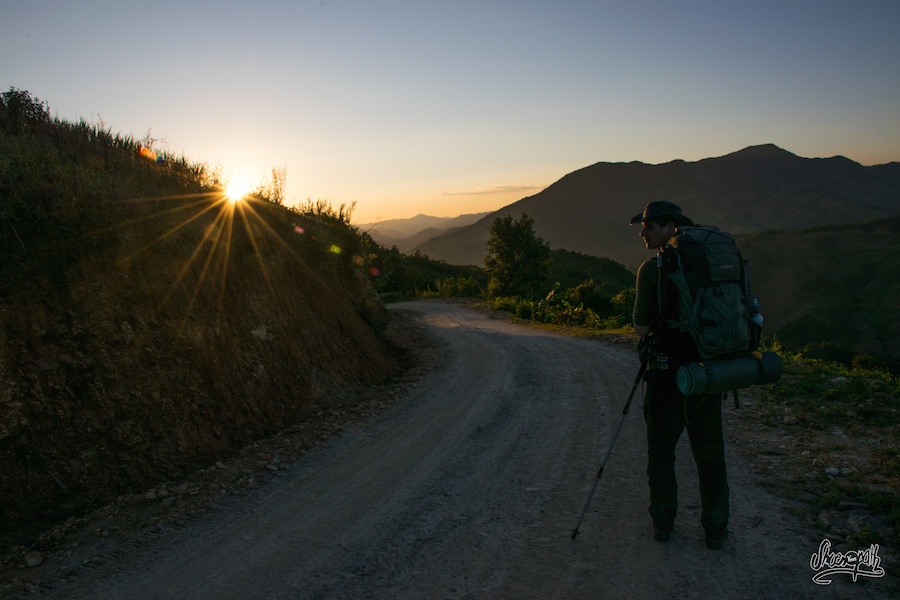
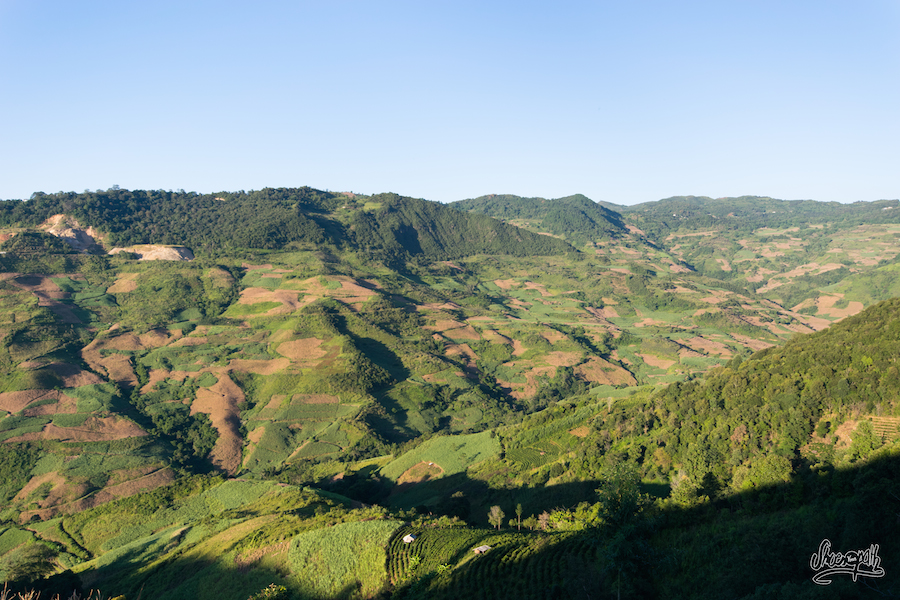
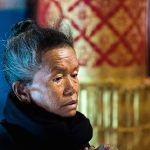
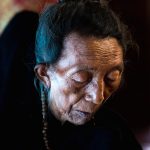
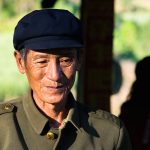
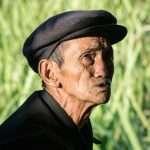
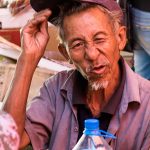
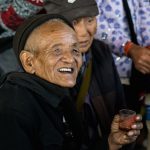
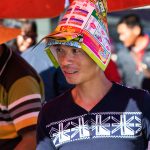
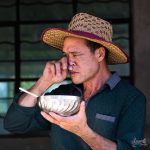
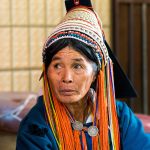
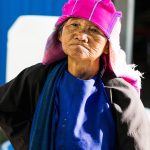
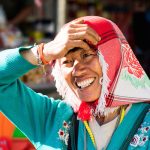
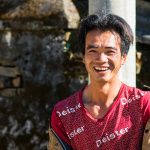
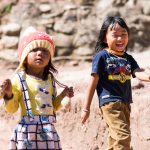
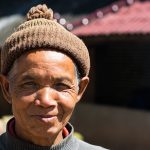
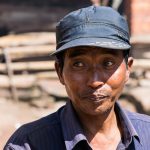
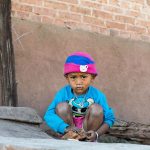
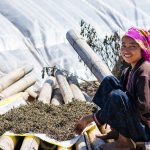
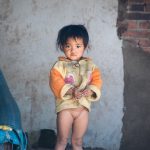
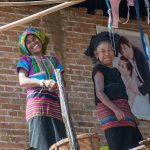

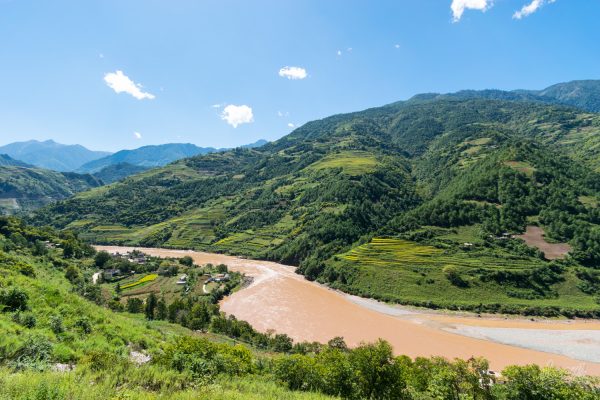
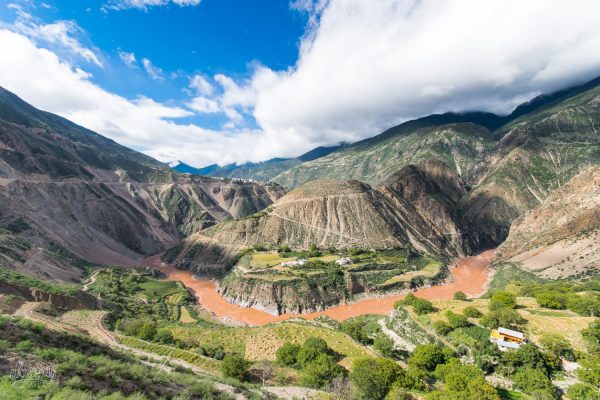
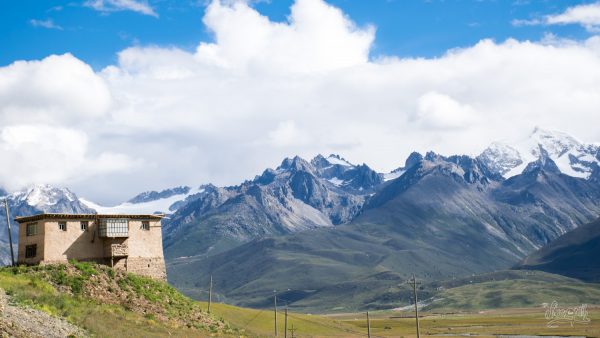
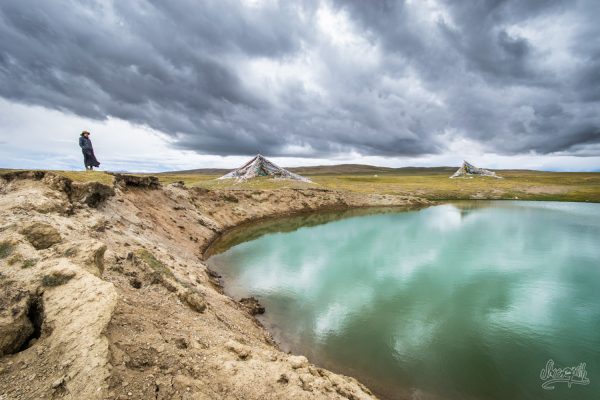
Wow, what a great tour and such a great description. I’ve been looking for a trekking blog for the Xishuangbanna for quite a while, as I am planning to visit Xishuangbanna in Winter this year. Super happy I found this now. Thanks so much for sharing these beautiful pictures and great text.
Hello.
Very nice to read Your guide and experience.
Greetings Astrid Anna
Are you still traveling? We were in Damenglong in the 1980’s and did some walking on our own. I have some questions for you if you still reply to this site.
Thank you.
Hi,
Yes we are still traveling regularly.
That trip in Xishuangbanna was in 2015 though… Ask your questions but not sure we can answer 🙂